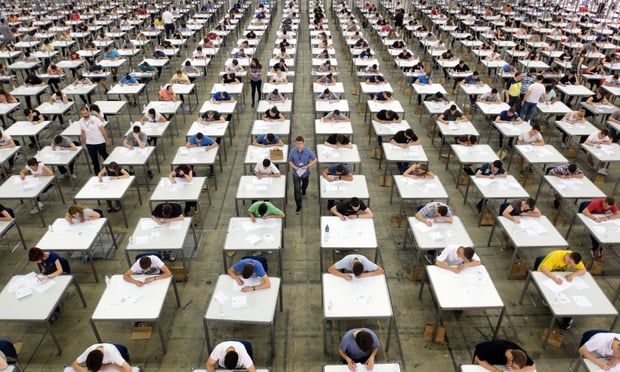Fall In-Person NJ Bar Exam Canceled, Goes Online Only Due to COVID-19
The state's in-person exam that was scheduled for Sept. 9-10 and had attracted some 2,000 applicants, now will be administered remotely by the New Jersey Board of Bar Examiners on Oct. 5-6, according to the order signed by Chief Justice Stuart Rabner.
July 15, 2020 at 05:51 PM
4 minute read

The New Jersey in-person bar exam, originally scheduled for July 2020, then postponed until early September due to the coronavirus, has now been fully canceled.
Those planning to take the fall bar exam will need to take it remotely under a new Supreme Court order announced Wednesday. New Jersey joins Maryland, Massachusetts, Pennsylvania and the District of Columbia, which had already moved their July in-person exams to September before canceling them in favor of the Oct. 5-6 online test.
Louisiana, Florida, Texas, Tennessee and Kentucky canceled in-person tests that were scheduled this month as COVID-19 cases continue to surge rapidly in certain parts of the country, particularly in the West and South.
The state's in-person exam that was scheduled for Sept. 9-10 and had attracted some 2,000 applicants, now will be administered remotely by the New Jersey Board of Bar Examiners on Oct. 5-6, according to the order signed by Chief Justice Stuart Rabner.
"Like other court functions that have transitioned successfully to remote operations, a remote bar examination will maintain professional standards and public confidence at a time when health officials counsel against large, in-person events," Rabner said in the Wednesday release.
"Under the circumstances, and guided by the science, the Supreme Court has concluded it is simply unsafe to gather 2,000 applicants, even across multiple coordinated locations, for an in-person bar examination," added Rabner.
Rabner said while the September test was to be administered at multiple locations, the nationwide spread of COVID-19 remains a concern. Some Western and Sunbelt states have reported alarming increases in recent weeks that have prompted governors in those states to scale back their reopenings or, in California's case, again close bars and other businesses for a second time.
The chief justice said of the nearly 2,000 law school graduates who applied to take the exam, about 900 were from out of state, and 150 from states whose residents are subject to the governor's two-week self-quarantine advisory. In a tweet on Tuesday, Gov. Phil Murphy announced he had updated his travel advisory. The governor said anyone now traveling to New Jersey from these 22 states should quarantine for 14 days: Alabama, Arizona, Arkansas, California, Florida, Georgia, Idaho, Iowa, Kansas, Louisiana, Minnesota, Mississippi, Nevada, New Mexico, North Carolina, Ohio, Oklahoma, South Carolina, Tennessee, Texas, Utah and Wisconsin.
Not surprisingly, some of these same states have canceled their own in-person bar exams. This month Louisiana became the first jurisdiction to cancel a planned online bar exam. The Louisiana Supreme Court and the court's Committee on Bar Admissions in early June announced that bar takers would have the option to take exams scheduled for July and October in person or online. The court had already reduced the length of the exam from the traditional three days down to one.
"Although New Jersey has made significant inroads to combat the effect of the COVID-19 pandemic, COVID-19 is gaining strength in many areas of the country and continues to be a serious threat to health and safety," Rabner said of the changing landscape.
Maryland, Massachusetts, Tennessee and the District of Columbia have recently announced they too will administer a remote bar examination in October.
"The Court will seek to enter into agreements with those jurisdictions, and any others that follow suit, to allow exam results to be accepted reciprocally," Rabner said.
Candidates are urged to visit the Board of Bar Examiners' website for further information regarding their applications and the upcoming exam.
Those who already have applied are automatically registered for the October remote exam.
Candidates can also defer to a future in-person exam and would be permitted to temporarily practice law, without a license, under the supervision of experienced attorneys. An order signed by the chief justice on April 6 relaxed court rules, but requires the supervising attorneys to be in good standing and have been licensed for a minimum of three years.
Rabner said then that the April court order was meant not only to help fulfill legal needs during the state's prolonged public health emergency, but also to buffer the economic blow for recent graduates by enabling them to gain practical experience and have some type of income.
Several states, including New York, have said they are considering similar moves in light of bar exam complications because of COVID-19, but New Jersey looks to be the first state to have made the supervised practice arrangement official.
This content has been archived. It is available through our partners, LexisNexis® and Bloomberg Law.
To view this content, please continue to their sites.
Not a Lexis Subscriber?
Subscribe Now
Not a Bloomberg Law Subscriber?
Subscribe Now
NOT FOR REPRINT
© 2025 ALM Global, LLC, All Rights Reserved. Request academic re-use from www.copyright.com. All other uses, submit a request to [email protected]. For more information visit Asset & Logo Licensing.
You Might Like
View All

Appellate Division Tosses Challenge to Rutgers Board Members That Ensnared NJ Lawyer
5 minute read
Seton Hall Escapes COVID-19 Wrongful Death Suit After Student Found Dead in Dorm
4 minute read
Where CFPB Enforcement Stops Short on Curbing School Lunch Fees, Class Action Complaint Steps Up
5 minute readTrending Stories
- 1Rejuvenation of a Sharp Employer Non-Compete Tool: Delaware Supreme Court Reinvigorates the Employee Choice Doctrine
- 2Mastering Litigation in New York’s Commercial Division Part V, Leave It to the Experts: Expert Discovery in the New York Commercial Division
- 3GOP-Led SEC Tightens Control Over Enforcement Investigations, Lawyers Say
- 4Transgender Care Fight Targets More Adults as Georgia, Other States Weigh Laws
- 5Roundup Special Master's Report Recommends Lead Counsel Get $0 in Common Benefit Fees
Who Got The Work
J. Brugh Lower of Gibbons has entered an appearance for industrial equipment supplier Devco Corporation in a pending trademark infringement lawsuit. The suit, accusing the defendant of selling knock-off Graco products, was filed Dec. 18 in New Jersey District Court by Rivkin Radler on behalf of Graco Inc. and Graco Minnesota. The case, assigned to U.S. District Judge Zahid N. Quraishi, is 3:24-cv-11294, Graco Inc. et al v. Devco Corporation.
Who Got The Work
Rebecca Maller-Stein and Kent A. Yalowitz of Arnold & Porter Kaye Scholer have entered their appearances for Hanaco Venture Capital and its executives, Lior Prosor and David Frankel, in a pending securities lawsuit. The action, filed on Dec. 24 in New York Southern District Court by Zell, Aron & Co. on behalf of Goldeneye Advisors, accuses the defendants of negligently and fraudulently managing the plaintiff's $1 million investment. The case, assigned to U.S. District Judge Vernon S. Broderick, is 1:24-cv-09918, Goldeneye Advisors, LLC v. Hanaco Venture Capital, Ltd. et al.
Who Got The Work
Attorneys from A&O Shearman has stepped in as defense counsel for Toronto-Dominion Bank and other defendants in a pending securities class action. The suit, filed Dec. 11 in New York Southern District Court by Bleichmar Fonti & Auld, accuses the defendants of concealing the bank's 'pervasive' deficiencies in regards to its compliance with the Bank Secrecy Act and the quality of its anti-money laundering controls. The case, assigned to U.S. District Judge Arun Subramanian, is 1:24-cv-09445, Gonzalez v. The Toronto-Dominion Bank et al.
Who Got The Work
Crown Castle International, a Pennsylvania company providing shared communications infrastructure, has turned to Luke D. Wolf of Gordon Rees Scully Mansukhani to fend off a pending breach-of-contract lawsuit. The court action, filed Nov. 25 in Michigan Eastern District Court by Hooper Hathaway PC on behalf of The Town Residences LLC, accuses Crown Castle of failing to transfer approximately $30,000 in utility payments from T-Mobile in breach of a roof-top lease and assignment agreement. The case, assigned to U.S. District Judge Susan K. Declercq, is 2:24-cv-13131, The Town Residences LLC v. T-Mobile US, Inc. et al.
Who Got The Work
Wilfred P. Coronato and Daniel M. Schwartz of McCarter & English have stepped in as defense counsel to Electrolux Home Products Inc. in a pending product liability lawsuit. The court action, filed Nov. 26 in New York Eastern District Court by Poulos Lopiccolo PC and Nagel Rice LLP on behalf of David Stern, alleges that the defendant's refrigerators’ drawers and shelving repeatedly break and fall apart within months after purchase. The case, assigned to U.S. District Judge Joan M. Azrack, is 2:24-cv-08204, Stern v. Electrolux Home Products, Inc.
Featured Firms
Law Offices of Gary Martin Hays & Associates, P.C.
(470) 294-1674
Law Offices of Mark E. Salomone
(857) 444-6468
Smith & Hassler
(713) 739-1250






